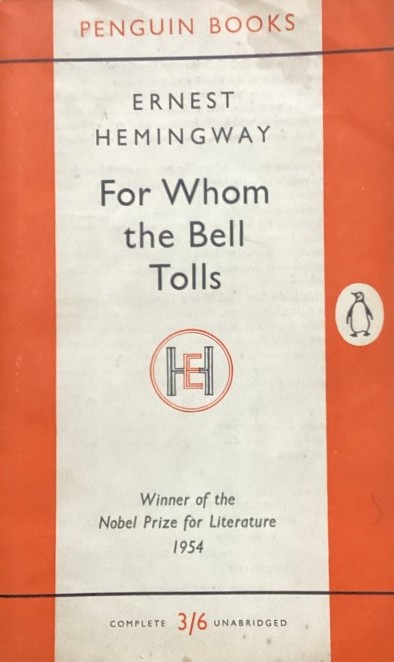Inspiring Older Readers
 posted on 07 Aug 2022
posted on 07 Aug 2022
For Whom The Bell Tolls by Ernest Hemingway
Sometimes a writer’s reputation and public persona can be so huge it overshadows the source of that fame - the books. The life and times of Ernest Hemingway is almost public property - the bullfights, the womanising, fishing and friendships with the likes of F. Scott Fitzgerald. Then there’s the man of action - the hunter, the fighter and the war hero - who seems to be the very distillation of macho alpha-male bravado. But this is also the man who ended his own life with a shotgun in 1961 - suggesting he had his own deep dark terrors to contend with.
Against the backdrop of a life so large the books can almost become an afterthought but I think that For Whom The Bell Tolls demonstrates that, at his best, Hemingway is a masterful novelist. This is a story of the reality of war crushed into a single incident during the Spanish Civil War and it not only draws back the curtain on the suffering, misery and fanaticism of war but it also explores the counterbalancing force of love. It’s as if love and war are weighed in the balance and both turn out to be both noble and destructive.
The review of the book by Time magazine captures the scope of the book quite well:
“For Whom the Bell Tolls is 1) a great Hemingway love story; 2) a tense story of adventure in war; 3) a grave and sombre tragedy of Spanish peasants fighting for their lives. But above all it is about death. The plot is simple, about a bridge over a deep gorge behind Franco’s lines. Robert Jordan, a young American International Brigader, is ordered to blow up the bridge. He must get help from the guerrillas who live in Franco’s territory. The bridge must be destroyed at the precise moment when a big Loyalist offensive begins. If the bridge can be destroyed, the offensive may succeed. If the offensive succeeds, the struggle of the human race against fascism may be advanced a step. The courage of the Spanish peasants is linked to the fate of all mankind.”
The action takes place over four days and Hemingway puts the emotions and psychology of the partisans under scrutiny - often contrasting the raw, often fearful or braggadocio spirit of the local peasant fighters with the more detached and analytical eye of Jordan who holds his duty to the Republican cause as absolute. The barrier between the locals and the incoming American begins to crumble when he falls in love with Maria, a young woman who has been taken in after she suffered terrible sexual abuse at the hands of the Falangists.
Constantly shifting power relationships become the currency of this band of guerrilla fighters and soon it becomes clear that the mission they have embarked on is going to end up as a fiasco. The undertow of emotional conflict mirrors and somehow captures a much bigger critique of the way the war was conducted by the supporters of the Republic - enabling Hemingway to fictionalise experiences and observations he’d gained by his own first-hand engagement in the war.
There are things here that I find less successful. Hemingway deliberately decided to write the book as if he were directly translating many phrases from Spanish and this gives some of the sentence structure and vocabulary a strange (and at time arcane) feel. I think younger readers in their late teens or twenties might well find the gender politics of the book hard to accommodate - there are plenty of examples here of Hemingway in full macho mode but I really believe it’s worth pushing past some of these hinderances because this is a book full of deep emotion and it’s a portrait of men and women at war that doesn’t depend of sentimental or cliched notions. It’s a book about the Spanish Civil War but it’s also about every war that will ever be fought. It’s also a book about human relationships - which is also, too often, a place of conflict.
Paperbacks and hardback reprints are not difficult to find and you’ll get a copy for well under £10.
Terry Potter
August 2022
Postscript
A further review of 'For Whom The Bell Tolls' by one of our guest reviewers, Alun Severn - along with some thoughts about 'Across the River and Into the Trees' - can be found here.